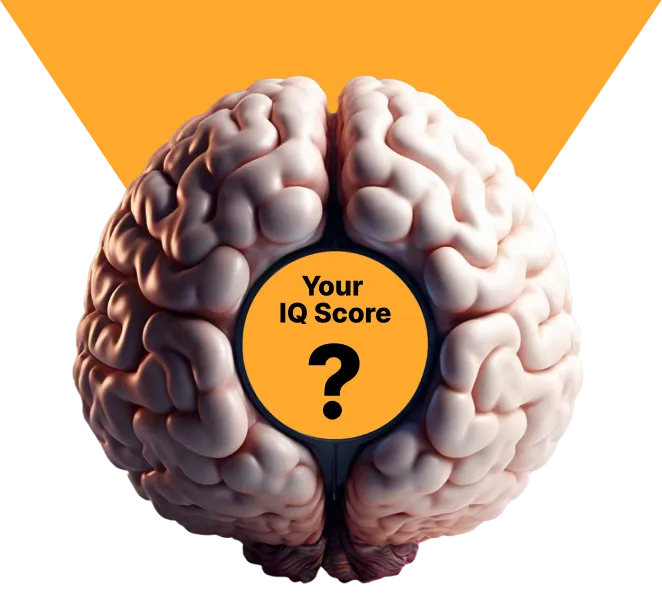IQ Test
Take our free online IQ test to assess your cognitive abilities. Get instant, accurate results and a downloadable certificate. Accessible for all age groups!

Take our free online IQ test to assess your cognitive abilities. Get instant, accurate results and a downloadable certificate. Accessible for all age groups!

IQ, or Intelligence Quotient, is a numerical score that measures cognitive abilities like reasoning, problem-solving, and understanding. Developed to assess intellectual potential, IQ scores are widely used in education, career assessments, and psychological research to understand individual strengths and guide personal development.
An IQ test is a standardized tool designed to measure cognitive abilities like reasoning, logic, and problem-solving. The concept originated with Alfred Binet in the early 1900s to identify students needing academic support. Over time, Intelligence Quotient tests evolved and gained significance in psychology, education, and career assessment. Online IQ tests now make these evaluations accessible and convenient, offering instant results and certifications. These tests leverage advanced technology to ensure accuracy and reliability, making them credible tools for everyone.

The Stanford-Binet Intelligence Scale is one of the oldest and most widely used IQ tests, originally developed to assess children's cognitive development. It measures abilities in reasoning, problem-solving, and knowledge. This test is ideal for evaluating intellectual aptitude in both children and adults and is widely used in educational settings.

The WAIS is a comprehensive intelligence test designed for adults, focusing on verbal and performance-based skills. It evaluates areas like memory, comprehension, and processing speed, offering a detailed understanding of cognitive strengths and weaknesses. This test is often used in clinical and research settings for psychological assessments.

Raven’s Progressive Matrices is a non-verbal IQ test that measures abstract reasoning and problem-solving skills. It uses visual puzzles, making it culturally neutral and accessible for individuals with diverse language backgrounds. This test is commonly used in educational and professional assessments to evaluate general intelligence.

The Cattell Culture Fair Test is designed to minimize cultural and language biases, focusing on fluid intelligence. It evaluates reasoning and pattern recognition through non-verbal tasks like sequences and classifications. This test is ideal for identifying cognitive potential in multicultural and international contexts.

The test consists of 30 questions designed to evaluate different aspects of intelligence. These questions are categorized into four types:
The test is time-bound, with a duration of 30 minutes, ensuring users stay focused while assessing their cognitive speed and accuracy.

Built on generative AI technology, the test adjusts the difficulty of questions in real time based on the user’s responses, offering a personalized and accurate assessment of intelligence.

Upon completion, users receive an IQ score and a downloadable certificate. The score reflects cognitive abilities in reasoning, problem-solving, and decision-making, helping users understand their intellectual strengths.

Our IQ test uses advanced generative AI technology to create a personalized experience. The AI dynamically adapts questions based on the user’s intelligence level, ensuring accurate assessments and meaningful insights into their cognitive abilities.

The test is completely free, with no hidden fees or registration charges. Users can take the IQ test without financial commitments, making it accessible to everyone, regardless of their financial background.

Get precise results immediately after completing the test. Our advanced system processes responses quickly to deliver accurate IQ scores, eliminating waiting times and ensuring a smooth user experience.

Users receive a downloadable certificate upon completing the test. This certificate validates their IQ score, making it a valuable document for personal, educational, or professional purposes.

The test is designed for all, including school kids, college students, working professionals, and retirees. It’s a versatile tool that supports cognitive growth and engagement across various age groups and professions.
An IQ distribution chart helps you understand how your score compares to others. Most IQ scores follow a bell curve, with the average score set at 100. Here's a general breakdown:

These IQ ranges represent the natural distribution of intelligence within the population. The majority fall within the average range (85-115), while only a small percentage excel as gifted or face intellectual challenges. This chart helps users understand how their score compares to others globally.

Taking an IQ test helps individuals identify their cognitive strengths and weaknesses, offering insights into areas for self-improvement. Understanding your intellectual capabilities enables better decision-making and problem-solving, fostering personal development and confidence in tackling challenges.

Students can use IQ tests to pinpoint their learning strengths, such as logical reasoning or numerical aptitude. This knowledge allows them to focus on areas where they excel or need improvement, leading to better academic outcomes and tailored study strategies.

An IQ score can serve as a valuable asset in professional settings, showcasing intellectual abilities in job applications or personal portfolios. Employers may view a strong IQ score as an indicator of analytical and problem-solving skills, boosting career opportunities.

Intelligence quotient tests challenge the brain, improving reasoning, logic, and cognitive agility. Regular participation in such tests helps sharpen mental skills, fostering quicker thinking and better problem-solving abilities in both personal and professional scenarios.

Receiving a professional certificate after completing an IQ test validates your intellectual achievement. This certification can be a source of pride and is useful for demonstrating cognitive strengths in academic, personal, or professional contexts.